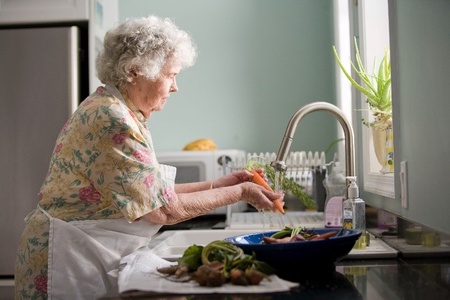In part one we looked at how coronavirus is transmitted. We concluded that coronavirus transmission from food is rare following good hygiene practices. We also discussed fomites which may be able to transmit coronavirus from food packaging though again this is a rare occurrence. Our homes actually offer a great line of defence against fomite transmission. Household defence can easily be achieved following our five practical hygiene hacks to keep our households, families and our food safe.
1. Clean surfaces
Cleaning surfaces is essential when dealing with any food. Surfaces are prone to transmission as we drop and pick up certain items. Keeping shopping bags away from work surfaces and using a spray surface cleaner to disinfect are both easy ways to avoid transmission. Spray cleaners are repeatedly tested in scientific studies to ensure their effectiveness meets commercial standards and kills germs. Likewise, our trusty kitchen units are normally made from materials which are easy to clean and are hard for germs to live on. The best approach is to clean before, during and after to keep the area safe for everyone in the house. Normally sprays have instructions on how to use effectively on the product. Sanitising areas where the packaging has been placed is a good idea to stop the transfer of potential fomites from packaging to the work surface.
2. Wash your hands
Handwashing during food handling is integral to breaking the chain of transmission. Hand detergents break down the virus particles keeping us and our food safe. Again, the before, during and after rule is the best way to reduce transmission. Some may prefer to use gloves when handling food, which is good, but it is important to remember to change gloves regularly to avoid cross contaminating your different food groups like meats with raw vegetables. It is crucial to remember gloves should not be a substitute and you should wash your hands before and after if you decide to wear gloves.
3. Packaging
So, do we need to be disinfecting our packaging? Current guidelines suggest to avoid transmission, where possible, packaging should be removed and disposed of before storing away the food items. Packaging containing food should not be washed with detergents, as there is potential for the chemicals from the detergent to contaminate the food, and some of these chemicals can be harmful. Once the food is removed, you may wish to wash the packaging before disposing or recycling which is fine.
4. Wash your groceries in water
We mentioned in the first blog loose food items are more likely to act as fomites because they normally experience more handling. All you need to do is give groceries a quick rinse under cold running water to remove any contaminants. This is a good routine hygiene practice because produce may be sprayed at the farm, or during food production and it easily removes any leftover residues, dirt or any remaining germs. Occasionally you may wish to keep the items in the packaging (i.e. salads) because these items have sensitive shelf lives and wash just before use. Where possible packaged items should be stored separately to loose items. Meats should not be washed, as this can lead to surface contamination so it’s fine to store meat in the packaging or transfer to a container or sealable bag. Our final tip will explain how to avoid transmission through meats.
5. High temperatures
For cooking meats, the standard advice is to cook until it reaches 700c and maintain the temperature for at least 2 minutes. Thoroughly cooking meat is a good way to avoid transmission of the virus because coronavirus is killed in high temperatures. This is an easy way to keep your households safe. The standard advice protects our food against foodborne pathogens whether that be coronavirus, bacteria or other contaminants.
Hopefully, these five practical hygiene hacks have cleared up some concern about which hygiene practices to follow. Many organisations have detailed information regarding how to keep our food safe during lockdown such as the Food Standards Scotland (FSS), food standards agency (FSA) (England, Wales and Northern Ireland) and even the World health organisation who have produced a handy '5 keys to safer food' leaflet (available in resources).
The key message in protecting our households is to do whatever makes us feel safe during these times. The items we have discussed above are well recommended good hygiene practices which hopefully reassures that you don't have to spend hours scrubbing plastic packaging to keep safe at home.
Resources
- DeVere E, Purchase D. Effectiveness of domestic antibacterial products in decontaminating food contact surfaces. Food Microbiology. 2007;24(4):425-30.
- FSS. Cross contamination: Food Standards Scotland; 2020 [cited 2020 01/03/2020]. Available from: https://www.foodstandards.gov.scot/consumers/food-safety/at-home/washing-and-preparing-food-1.
- FSS. Coronavirus (COVID-19) and food Scotland: Food Standards Scotland; 2020 [cited 2020 25/05/2020]. Available from: https://www.foodstandards.gov.scot/consumers/food-safety/coronavirus#Advice%20on%20infection%20control%20when%20handling%20food.
- WHO. Five keys to safer food. Geneva: World Health Organisation; 2006. Available from: https://apps.who.int/iris/bitstream/handle/10665/43546/9789241594639_eng.pdf;jsessionid=16924500BD95D1F808E3E57235A194DF?sequence=1
- WHO. Questions relating to consumers: Coronavirus disease 2019 Q&As Geneva, Switzerland: World Health Organisation; 2020 [cited 2020 25/05/2020]. Available from: https://www.who.int/emergencies/diseases/novel-coronavirus-2019/question-and-answers-hub/q-a-detail/questions-relating-to-consumers.
- WHO. Modes of transmission of virus causing COVID-19: implications for IPC precaution recommendations. Geneva, Switzerland.: WHO; 2020 [cited 2020 25/05/2020]. Available from: https://www.who.int/news-room/commentaries/detail/modes-of-transmission-of-virus-causing-covid-19-implications-for-ipc-precaution-recommendations.
Image sources: Artists from Unsplash: Jason Brisoce, The Creative Exchange and the CDC (centre for disease control).


